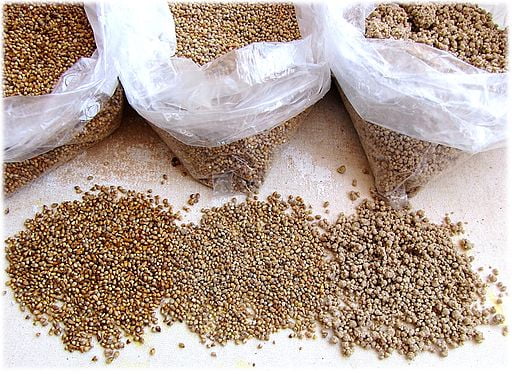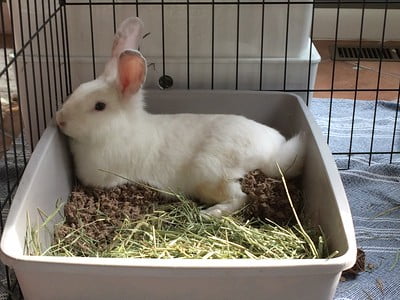Last Updated on March 14, 2023 by Marjon Ramos
If there’s one thing rabbits would go crazy for, it’s sugary treats. I remember one time my rabbits, Tyr and Freya, ate half the oranges I accidentally dropped on the floor!
If I didn’t notice the missing orange, those two would probably finish the whole thing! That’s how much rabbits love sugary treats like oranges.
That’s why we, as rabbit owners, should be careful with treats because our babies love them too much. As we know, too many treats are bad for rabbits.
In this article, I would discuss whether or not rabbits can eat oranges and how much you should give based on their size, age, and for rabbits that are pregnant.
I would also discuss the risk and benefits of feeding oranges to rabbits. And finally, I would also touch on the different alternative treats to oranges.
So without further ado, let’s get started.
Table of Contents
Do rabbits like eating oranges?
Yes, rabbits like to eat oranges because they have a lot of sugar, and rabbits love sugary treats. In fact, your rabbit would probably eat the whole orange if you left it to them alone.
Don’t do that though. Oranges should only be fed to rabbits in small amounts 1-2 times a week. Feeding your rabbit too much could lead to digestive issues because oranges have a lot of sugar and citrus.
Are oranges safe to be eaten by rabbits?
Yes, oranges are safe for rabbits as long as you only give them in moderation. Oranges contain a lot of sugar and citrus, which are bad for rabbits if fed in large amounts.
Sugar could disrupt your rabbit’s gut flora, which could be fatal if it triggers a bout of diarrhea or GI stasis. Too much sugar could also cause dental issues in rabbits, so moderation is key.
Only feed your rabbit small slices of oranges 1-2 times per week.
If your rabbit is young, or less than 7 months old, then you should not feed your bunnies any oranges. Bunnies should focus on eating hay during this time.
Are oranges good for rabbits?
In small amounts, oranges can provide some nutritional benefits because they do contain some vitamins and dietary fiber. But just because it can be good, it doesn’t mean that you can overfeed your rabbit’s oranges.
Oranges contain a ton of sugar and citrus that would upset a rabbit’s stomach if fed regularly in large amounts.
How many oranges can a rabbit eat?
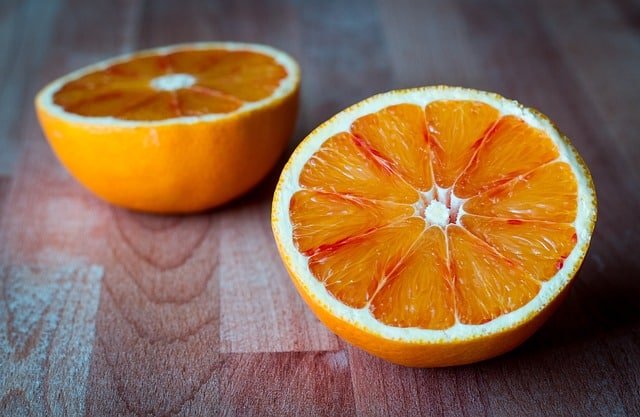
Here’s a table to help you decide how much sugary treats you should limit giving to your rabbits:
| Rabbit’s weight based on breed | Allowed sugary treats |
|---|---|
| Small breed (1.1–3.5 pounds) | 1 teaspoon |
| Medium breed (6 to 10 pounds) | 1-2 tablespoon |
| Large breed ( 9 and 12 pounds) | 2-3 tablespoon |
Based on the table above, you can feed your rabbit a pinch of oranges if it is a small breed like Netherland Dwarfs.
While rabbits that are of medium breed can be given half a slice of orange 1-2 times per week.
Finally, rabbits that are large, like Flemish giants, can eat a slice of orange 1-2 times per week without a problem. But, another factor that is important before giving any oranges to your rabbits is their age.
Adult or fully grown rabbits
Adult or mature rabbits that are more than 7 months old can eat oranges normally based on the weight that I mentioned above. The general rule for feeding adult rabbits sugary treats like oranges is to only give them these in small amounts occasionally.
Half a slice of orange 1-2 times a week should be enough for adult rabbits to satisfy their sweet tooth.
Young or growing rabbits
Young rabbits and bunnies that are less than 7 months old have underdeveloped gut flora and should focus on eating hay until they are older.
Overfeeding sugary treats like oranges to bunnies could lead to GI stasis, uneaten soft caecotrophs, diarrhea, and dental problems.
If your bunnies are suffering from these conditions, always consult a veterinarian.
Pregnant or lactating rabbits
While pregnant or lactating rabbits can eat treats like oranges, it’s still preferred that they don’t eat any. The reason is that pregnant rabbits should focus on eating foods that are more nutrient-efficient to support their pregnancy.
For pregnant rabbits, it’s best to not give any oranges or sugary treats and instead focus on feeding hay and veggies.
When can rabbits start eating oranges?
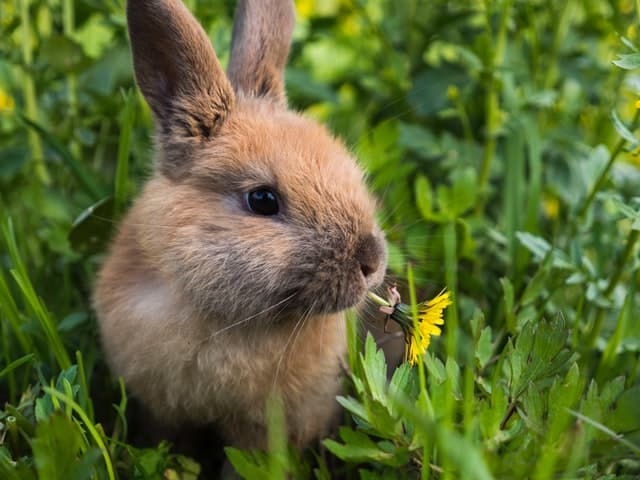
Gist:
Rabbits can start eating oranges at 7 months. Make sure you SLOWLY incorporate it into their diet.
Bunnies or rabbits that are less than 7 months old should not be given any oranges because their gut flora is not yet developed to process large amounts of sugar.
Feeding your bunnies oranges when they’re less than 7 months old could lead to diarrhea or GI stasis, which is fatal extremely fast.
For the time being, when your rabbit is still growing, just focus on feeding them hay, and at 12 weeks, you can slowly start incorporating veggies.
Here’s a table to guide you on how much you should feed your bunnies as they get older.
| Age | Hay | Pellets | Vegetables | Fruits |
|---|---|---|---|---|
| 7 weeks to 7 months | Unlimited alfalfa | Unlimited | — | — |
| 12 weeks | Unlimited alfalfa | Unlimited | Introduce vegetables (one at a time) in small quantities < 1/2 oz (15 g) | — |
| 7 months to 1 year | Introduce grass hay, decrease alfalfa | Decrease amount fed to ½ cup per 6 lbs (2.7 kg) BW | Increase vegetables fed daily gradually | No more than 1-2 oz (30-60g) per 6 lbs (2.7 kg) BW |
| Adult (1-5 y) | Unlimited grass hay, oat hay, straw | ¼ to ½ cup per 6 lbs (2.7 kg) BW | 1-2 cups per 6 lbs (2.7 kg) BW | No more than 2 tbsp per 6 lbs (2.7 kg) BW |
| Seniors (>6 y) | Increase alfalfa hay fed to frail, older rabbits but monitor calcium levels | Continue adult diet if weight is okay; frail, older rabbits may fed unlimited pellets |
When should you not feed oranges to rabbits?
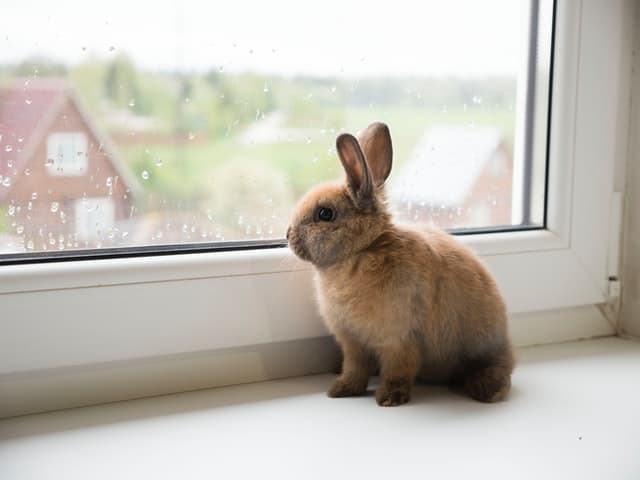
Gist:
If you notice any changes in your rabbit’s stool, stop giving your rabbits oranges or any sugary treats.
Feeding unnecessary foods like sugary treats when your rabbit already has digestive issues would further exacerbate the problem. If you suspect any changes in your rabbit’s stool, like its consistency, color, or size, immediately remove any other food except hay.
Also, bring your rabbit to a veterinarian if they are showing symptoms of digestive distress because it is fatal to rabbits extremely fast.
Risk of overfeeding oranges to rabbits.
Obesity
Orange being high in sugar could lead to obesity when fed in large amounts regularly. Make sure that your rabbit’s diet is mainly hay and some veggies.
Treats should only be fed once or twice a week in small amounts. The best diet for rabbits should be 90% hay, 5–10% veggies, and some treats here and there.
Dental problems
Sugar and citrus on oranges could damage your rabbit’s teeth if fed in large amounts. Dental problems in rabbits could lead to life-threatening conditions because rabbits with dental issues would refuse to eat.
Make sure that you’re monitoring your rabbit’s teeth from time to time and look out for signs of dental problems like:
If you notice any of these symptoms, immediately consult your veterinarian.
Gastrointestinal stasis
Gastrointestinal stasis is the most dangerous risk when overfeeding rabbits on low-fiber diets. Oranges are especially bad because not only are they low in fiber, which is important to rabbits’ gut health, but they are also high in citrus and sugar, which could increase the risk of GI stasis.
If your rabbit is suffering from GI stasis, immediately bring your rabbit to a veterinarian.
Soft uneaten caecotrophs
Overfeeding oranges to rabbits could soften their caecotrophs and cause them to refuse to eat them. The main reason for uneaten caecotrophs is a diet that is low in fiber or foods that are high in water content.
This condition could easily be fixed by removing any other food except hay. Be careful, though, because uneaten caecotrophs are often confused by diarrhea, which is fatal to rabbits and should be looked at by a veterinarian.
Great alternatives to oranges.
The best diet for a rabbit is the one that mimics what wild rabbits eat in the wild. Wild rabbits have an abundance of choice when it comes to food.
Here’s a list of alternatives to orange:
Warning:
Only feed these fruits to your rabbits in small amounts, once or twice a week at most.
FAQ (Frequently Asked Questions)
-
Can rabbits eat orange peels?
Yes, rabbits can eat orange peels. But don’t make it a habit; only give it to your rabbit as a treat.
-
Can rabbits eat orange skin?
Yes, rabbits can eat orange skin. But don’t make it a habit; only give it to your rabbit as a treat.
-
Can rabbits eat mandarin oranges?
Yes, rabbits can eat mandarin oranges in small amounts. Just make sure that your rabbit is old enough to eat treats and make sure that you’re only giving it to them 1-2 times a week.
-
Can rabbits eat orange leaves?
Yes, rabbits can eat orange leaves. Just wash it before giving it to your rabbits to remove any potential dirt and pesticide.
-
Can rabbits eat orange tree branches?
Yes, rabbits can eat orange tree branches. Just wash it before giving it to your rabbits to remove any potential dirt and pesticide.
-
Can rabbits eat orange tree leaves?
Yes, rabbits can eat orange tree leaves. Just wash it before giving it to your rabbits to remove any potential dirt and pesticide.
-
Can rabbits eat orange seed?
No, rabbits should not eat orange seeds. An orange seed is a choking hazard and could cause intestinal blockage due to its small size.
Conclusion
Oranges are a safe and great treat for rabbits. Just make sure that you only give oranges as an occasional treat.
Not to mention, rabbits love oranges because of their sweet taste. And as we all know, rabbits are suckers for anything sweet.
You can feed a small-breed rabbit or rabbits that are 1.1-3.5 pounds 1 teaspoon of oranges 1-2 times per week.
For medium breeds of rabbits that are 6-10 pounds, you can feed 1-2 tablespoons of oranges 1-2 times per week.
And for large breeds like the Flemish giant, you can safely feed them 2-3 tablespoons of sugary treats like oranges 1-2 times per week.
Another thing you want to consider before giving any treats to your rabbit is its age. In short, rabbits that are less than 7 months old should not be given any oranges or sugary treats.
Adult rabbits or rabbits that are more than 7 months old can eat oranges. But make sure that you slowly introduce it to your rabbit’s diet when you’re giving it to him for the first time.
Finally, pregnant or lactating rabbits should avoid eating any oranges or sugary treats and should focus on eating nutrient-packed foods like pellets and hay.
Cite this article:
Related Articles
- Can Rabbits Eat Asparagus? 9 things you need to know.
- Can Rabbits Eat Tomatoes? What You Need To Know.
- Can Rabbits Eat Watermelon? What You Need To Know.
- Can Rabbits Eat Grapes? What You Need To Know.
- Can Rabbits Eat Broccoli? What You Need To Know.
- Can Rabbits Eat Apples? What You Need To Know.
- Can Rabbits Eat Cabbages? What You Need To Know.
- Can Rabbits Eat Strawberries? What You Need To Know.
- Can Rabbits Eat Bananas? What You Need To Know.
- Can Rabbits Eat Blueberries? Here’s Why.
- Can Rabbits Eat Spinach? Your Questions Answered.
- Can Rabbits Eat Cucumbers? Here’s Why.
- Can Rabbits Eat Celery? What you need to know.
- Can Rabbits Eat Radishes: Everything You Need To Know
Sources
- Orange
- Gastrointestinal stasis
- RABBIT NUTRITION – AN OVERVIEW – Vet Times.
- Varga, Molly, and Frances Harcourt-Brown. Textbook of Rabbit Medicine: Revised and Edited. Elsevier, 2014.
- Smith, Martin H, et al. “Rabbits – From the Animal’s Point of View, 3: Rabbit Nutrition.” EScholarship, University of California, 3 Jan. 2018, escholarship.org/uc/item/942046xj.
- Patry, Karen, et al. The Rabbit-Raising Problem Solver: Your Questions Answered about Housing, Feeding, Behavior, Health Care, Breeding, and Kindling. Storey Publishing, 2014.
- Basic Rabbit Care – Lafeber Company.

